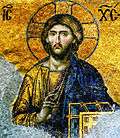Jacob Bar-Salibi
| Part of a series on |
| Eastern Christianity |
|---|
 |
|
Liturgy and worship |
|
Jacob Bar-Salibi also known as Dionysius Bar-Salibi was the best-known and most prolific writer in the Syriac Orthodox Church of the twelfth century.
Life
Bar-Salibi was, like Bar-Hebraeus, a native of Malatia on the upper Euphrates. In 1154 he was created bishop of Marash by the patriarch Athanasius VII; a year later the diocese of Mabbog was added to his charge. [1]
In 1166 Michael the Great, the successor of Athanasius, transferred him to the metropolitan see of Amid in Mesopotamia, and there he remained till his death in 1171. [1]
Of his writings probably the most important are his exhaustive commentaries on the text of the Old and New Testaments, in which he skillfully interwove and summarized the interpretations of previous writers such as Ephrem, Chrysostom, Cyril, Moses Bar-Kepha and John of Dara, whom he mentions together in the preface to his commentary on St Matthew. Among his other main works are a treatise against heretics, containing inter alia a polemic against the Jews and the Muslims; liturgical treatises, epistles and homilies. [1]
See also
References
- 1 2 3 Chisholm 1911.
- Attribution
![]() Chisholm, Hugh, ed. (1911). "Bar-Ṣalībī, Jacob". Encyclopædia Britannica (11th ed.). Cambridge University Press.; Endnotes:
Chisholm, Hugh, ed. (1911). "Bar-Ṣalībī, Jacob". Encyclopædia Britannica (11th ed.). Cambridge University Press.; Endnotes:
External links
- Dionysius bar Salibi, In Apocalypsim, Actus et Epistulas Catholicas, trans. I. Sedlacek, Romae : Karolus de Luigi (1909).
- http://www.textexcavation.com/gaiusrome.html#barsalibi
- http://www.tertullian.org/fathers/dionysius_syrus_revelation_01.htm